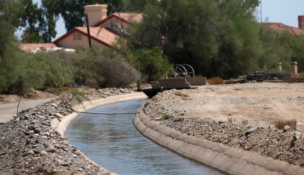New law clarifies setting bail for illegal border crossers
Arizona Capitol Reports Staff//July 6, 2007//[read_meter]
New law clarifies setting bail for illegal border crossers
Arizona Capitol Reports Staff//July 6, 2007//[read_meter]

(Some) employers beware
Maricopa County Attorney Andrew Thomas says questions remain on just how to implement a new law that sanctions employers who knowingly hire illegal immigrants, but adds he’ll vigorously enforce it.
Citing voter will, federal law and the opinion of Arizona Attorney General Terry Goddard, Gov. Janet Napolitano signed a bill intended to ensure enforcement of Prop. 100, a 2006 ballot initiative that forbids setting bail for illegal immigrants accused of serious felonies.
The legislation by Sen. Linda Gray, R-10, forces substantial changes to courtroom procedures and rules that critics claimed were being used by judges and court commissioners to circumvent the intent of the initiative, which roughly 80 percent of voters supported.
Under the provisions of S1265, courts are required to prove such suspects have entered or remained in the United States by probable cause. Napolitano’s signature ends the previous and more difficult standard of “proof evident presumption great.”
But Maricopa County Andrew Thomas, a frequent critic of the Maricopa County Superior Court, said at July 2 press conference that holding suspects accused of serious felonies without bail under the higher burden of proof did not become difficult until the initiative passed.
“When it was just murderers and rapists it wasn’t a problem,” said the county attorney, who has been very critical of judges and commissioners who have not allowed suspects’ own admissions and testimony of law enforcement officers to meet the higher standard.
Legislation appears to end debate
Prop. 100’s burden of proof debate between prosecutors, court personnel and defense attorneys appears to be over as Gray’s legislation expressly dictates that those statements, which previously were frequently dismissed as hearsay, must be now considered.
Defenders of the Maricopa County Superior Court have argued the proposition did not issue clear provisions as to how the courts should implement the initiative’s goal or establish a burden of proof to use.
An April order by the Arizona Supreme Court Presiding Justice Ruth McGregor instructed the courts to use proof evident presumption great during secondary appearances that are used to determine citizenship status.
And without the higher standard, said one public defense attorney at legal presentation in late June, literally any defendants accused of serious crimes who are not in possession of a birth certificate or passport could be held without bail.
“Without proof evident presumption great I could stick anyone of you in here (in jail) and hold you on Prop. 100 until your mom brings your birth certificate,” said Bob McWhirter, of the Office of the Legal Defender, to a group of journalists.
Gray’s legislation also shortens the legal process for defendants accused of serious felonies who are thought to be in the county illegally by eliminating the second pre-trial appearances, commonly referred to as Simpson hearings.
Now bond status will be determined within 24 hours at a defendant’s initial appearance, but new court procedure rules issued July 3 by McGregor allow prosecutors or defense attorneys to request a second hearing if new evidence in cases comes to light.
“I think that the legislation combined with the rules will make the court process Prop. 100 cases much better,” said Arizona Supreme Court spokeswoman Cari Gerchick. “Nothing is perfect and there can always be other adjustments that need to be made. If other situations arise we’ll deal with them in a deliberative way.”
On June 20, Attorney General Goddard filed a special action regarding Prop. 100 cases in Maricopa County. The suit asks the court to instruct the Maricopa County Superior Court to use the preponderance of evidence burden of proof when determining the citizenship of defendants.
















